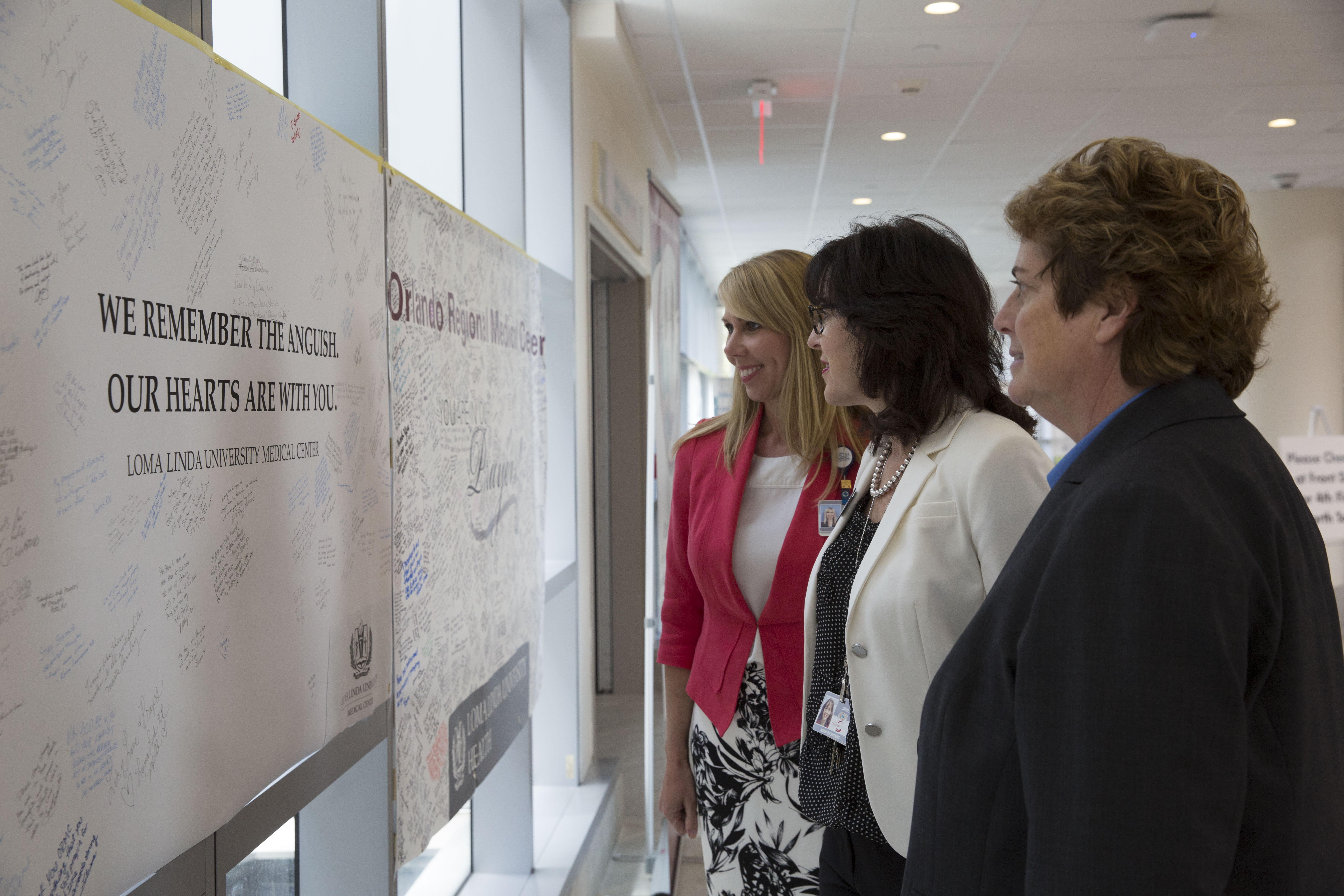On June 12, 49 people were killed and 53 were injured when a shooter opened fire inside the Pulse nightclub in Orlando, Fla., less than half a mile from Orlando Regional Medical Center. Suddenly, nurses at ORMC found themselves on the front lines of responding to the largest mass shooting in American history as they cared for dozens of victims and comforted patients' families.
Roughly a month after the shooting, ORMC CNO Jayne Willis, MSN, RN, and two ORMC patient care administrators — Alicia Bechtel, RN, and Louise Philp, RN — spoke with Becker's about their hospital's response to the tragedy.
Note: This conversation has been lightly edited for length and clarity.
Question: What was the nursing response like at Orlando Regional Medical Center directly after the shooting?
Louise Philp: Right away, extra nursing staff came to the emergency room. Arnold Palmer [Hospital for Children, a sister hospital of ORMC] sent staff over after the event. Additional staff from the intensive care unit were also deployed to the ER. We had to quickly mobilize resources to areas of greatest need.
Alicia Bechtel: We implemented HICS [Hospital Incident Command System]. We still had 450 patients [unrelated to the shooting] to take care of. We had to make sure staffing was appropriate in those units and we had to move patients that were currently in the nursing department to other units. My first response was transferring patients out of the Emergency Department to make room for the victims.
Q: What were the biggest challenges to the nursing department in dealing with this tragedy?
Jayne Willis: We are a Level I trauma center, so the nursing staff is very used to dealing with trauma. The number of patients dealing with these injuries at one time was challenging. The biggest challenge was dealing with the large influx of families and visitors. We had to support families, visitors and each other. We had to bring in counselors as well. We had to be advocates for the patients. It was the nurses' responsibility to speak on the patients' behalf.
LP: We felt it was our obligation to care for all the families that arrived at the hospital both those that had patients here in our care or those families still waiting to have their love one identified at the club. The toughest part was to try to get them information as fast as we could and meet their needs.
AB: The number of families that were grieving was overwhelming. We also had to work with the law enforcement to figure out which patient was where, and to identify patients and match them with their loved ones. Our guest services team did an outstanding job at managing the situation.
Q: What are you most proud of regarding ORMC's response?
JW: I was physically out of the country. To not physically be present in the beginning was very, very difficult. The thing I was most proud of is how well the team performed. I did not receive one complaint from a patient. I've never seen such collaboration and such teamwork. People just did what they were supposed to do. For years, we drilled for emergency response. The Pulse nightclub is just around the corner. Because they were so close we had police officers transporting victims, we had civilians carrying in patients. We had to triage them as soon as they hit the emergency department. By 9:45 the next morning, you wouldn't have even known there was a mass tragedy.
LP: I'm proud of the extraordinary care that was given to the patients. Everybody received the emotional support they deserved. As Alicia mentioned, guest services did an outstanding job. The ED looked normal. We did this without canceling any elective surgeries. The hospital kept right on running.
Q: How has this experience changed you?
AB: I'm just very proud of the team. We've always drilled for something like this, and I think when we run through these drills in the future, I'll take them even more seriously.
LP: I think it just reenergized me. It reminded me why I became a nurse. As an administrator, you can lose sight of that. This brought me back to my nursing roots — to be there for people when they need it the most.
JW: I was absolutely overwhelmed with the outpouring of support. Not only our local community but nationally. We received banners and food from administrators at other hospitals. That level of support gave us the encouragement we needed to prevail. I am committed to share the same level of support to other hospitals facing tragedy. I have really learned the importance of being ever-ready. We had decades of developing infrastructure and processes to respond and my continuing responsibility is making sure that we are ever-ready.
(Front, center, back: Alicia Bechtel, RN, Jayne Willis, MSN, RN, Louise Philp, RN)



